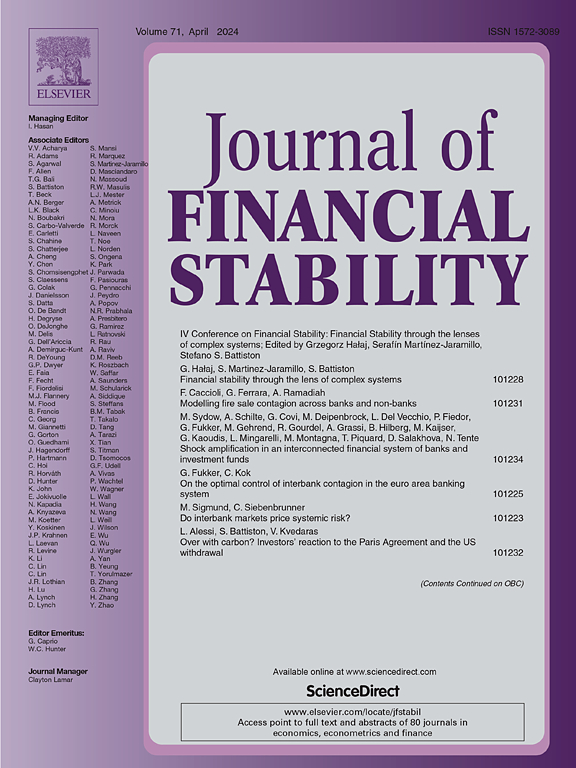G20 国家的宏观审慎政策和系统性风险
IF 4.2
2区 经济学
Q1 BUSINESS, FINANCE
引用次数: 0
摘要
该研究利用来自 20 国集团国家的 496 家银行组成的面板,评估了宏观审慎政策在降低系统性风险方面的作用。研究进一步评估了这些政策与货币政策工具以及银行和国家具体特征相结合的效用,发现宏观审慎政策在抑制系统性风险和促进经济稳定方面具有重大影响。研究发现,无论通胀压力和金融困境等经济条件如何,这种关系都是成立的。这一结果突出表明,在金融困境期间放松宏观审慎政策可以帮助银行应对系统性损失。我们将宏观审慎政策分为针对贷款需求和供给的政策,并发现这些政策在降低系统性风险方面具有互补性。我们的研究结果表明,宏观审慎政策在限制系统性风险方面具有不同的效果,其效果因银行规模、杠杆率、流动性和贷款集中度而异。最后,我们发现这些政策在限制不确定性对系统性风险的影响方面起着调节作用。本文章由计算机程序翻译,如有差异,请以英文原文为准。
Macroprudential policy and systemic risk in G20 nations
Using a panel of 496 banks from the G20 nations, the study assesses the role of macroprudential policies in reducing systemic risk. The study further assesses the utility of these policies in conjunction with monetary policy instruments and bank and country-specific characteristics and finds the significant impact of macroprudential policies in curbing systemic risk and promoting economic stability. The study finds this relationship to hold regardless of economic conditions like inflationary pressure and financial distress. The result highlights that easing macroprudential policies during financial distress can help banks cope with systemic losses. We split the macroprudential policies into policies targeting the demand and supply of loans and find complementarity among the policies to reduce systemic risk. Our results demonstrate the heterogenous effect of macroprudential policies in limiting systemic risk, with the effect varying with bank size, leverage, liquidity, and concentration of loans. Finally, we find a moderating role of these policies in limiting the impact of uncertainties on systemic risk.
求助全文
通过发布文献求助,成功后即可免费获取论文全文。
去求助
来源期刊

Journal of Financial Stability
Multiple-
CiteScore
7.70
自引率
9.30%
发文量
78
审稿时长
34 days
期刊介绍:
The Journal of Financial Stability provides an international forum for rigorous theoretical and empirical macro and micro economic and financial analysis of the causes, management, resolution and preventions of financial crises, including banking, securities market, payments and currency crises. The primary focus is on applied research that would be useful in affecting public policy with respect to financial stability. Thus, the Journal seeks to promote interaction among researchers, policy-makers and practitioners to identify potential risks to financial stability and develop means for preventing, mitigating or managing these risks both within and across countries.
 求助内容:
求助内容: 应助结果提醒方式:
应助结果提醒方式:


